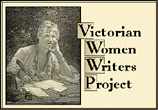
The University of Chicago Library
Victorian Women Writers Project
Published by Indiana University
Browse the Complete Bibliography.
The Vicotrian Women Writers
Home Page
Please direct comments or queries about this service to ets@lib.uchicago.edu.
Please direct comments or queries about the Victorian Women Writers Project to Perry Willett, General Editor.
General User Documentation for PhiloLogic
Database-Specific Searching Tips
Bibliographic Searching:
Title: Some titles in the Victorian Women Writers Project are quite long and may contain various forms of punctuation.
In searching the bibliography by title, one should use a minimum number of terms, choosing a term or phrase that is unique within the bibliography.
Note: at this time the apostrophe produces a "No documents found" message. Using a wildcard character (a period) in place of the apostrophe retrieves the desired result (e.g., typing lady audley.s secret finds the title Lady Audley's Secret).
The following punctuation marks have no adverse effect on a title search and, if appearing within a string, must be entered:
period (.), hyphen (-), question mark (?), exclamation mark (!), forward slash (/), and comma (,).
In all cases, spacing must match exactly that in the bibliography.
Date: The texts in the sample database range in date from 1839 to 1928.
Dates of first publication have been entered.
Orthographic Considerations:
No unusual orthography has been detected in this database.
Expect contractions such as betray'd or heav'n.
Also count on forms such as rejoicèd or belovèd.
Both British and American spellings of words can be found.
Searching "colour," for example, retrieves 136 occurrences while searching "color" retrieves one.
Wildcard characters or Boolean operators can help detect such inconsistencies.
One could enter betray.d or belov.d or colo.?r or color|colour to achieve the desired results.
Punctuation and Full-Text Searching:
Hyphens: One must include a hyphen when searching hyphenated words (e.g., all-powerful).
Realize as well that hyphens do not act as word separators in this database.
If looking for all occurrences of the word "powerful," one must enter .*powerful to be sure to find "all-powerful."
Apostrophes: One must include apostrophes when searching words with apostrophes in them (e.g., only by typing sister's will one find "sister's").
In this database apostrophes do not act as word separators.
Elision and contraction such as one finds in the phrase "more'n ever now he's a hero" must be entered without spaces before or after the apostrophes.
Formatting and Display:
Notes: Notes are being linked. Notes will not interfere with the searching of the text to which they refer.
Images: There are several images throughout the Victorian Women Writers Project. They are currently not linked.


